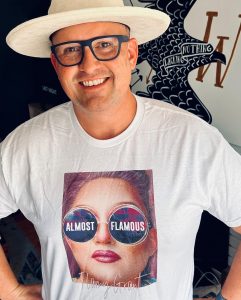Although recording artists Flamy Grant and Semler both had No. 1 songs on the Christian music charts in 2023, neither artist was asked to participate in the Gospel Music Association’s Dove Awards, Contemporary Christian Music’s premier event recognizing achievement within the genre in nearly 40 categories.
But neither of the openly queer artists expected a call from the GMA. In 2022, Semler put themselves up for best new artist after having two albums go No. 1 and was deemed ineligible, so Flamy Grant and Semler took to social media and invited their friends, fans and supporters to join them in the nosebleed section at the award show, which will be held at Lipscomb University in Nashville Oct. 17.

Matthew Blake Lovegood
“Think of our attendance at the Dove Awards as a sort of banner-wielding, exploratory scouting expedition,” said Matthew Lovegood, the singer-songwriter who performs as Flamy Grant, in an interview with BNG. “We’re not going to stir up trouble or demand a single thing. We’re simply going to be present, to express our queer joy, and to celebrate in our little corner of the room.”
Lovegood said they have “no idea” how many people plan to join them at the event, which will air on TBN Oct. 20. “I hope it will be as many as 50, but it could be as few as 15,” Lovegood said. “It will be very interesting to see who comes to talk with us, who doesn’t, and what kinds of new relationships and opportunities might develop just from simply being in the room.”
Why bother?
The artists’ participation in Christian music and their interest in the Dove Awards has made some wonder why they care about an industry that continues to snub them. Critics also question the value of a GMA endorsement as audiences increasingly find their music on social media and have waning interest in the award-show model.
“It’s not a chart worth cracking” one Tik-Tok user said in a comment directed at Flamy Grant on the platform. Lovegood responded in a 3:27 minute video acknowledging both the complexities around asking the queer community to support this summer’s movement to get Flamy Grant’s music on the CCM chart and their personal reasons for making the effort. In the video, Lovegood reiterated the stance that people should leave the church if they need to, but “there’s an argument to be made for trying to make that change from within.”
“I see value in taking up space in this world as a queer person. Queer Christians exist.”
In the video, Lovegood pointed to representation and visibility as reasons they operate in Christian spaces: “I see value in taking up space in this world as a queer person. Queer Christians exist.”
Accordingly, Lovegood cites representation as one of the driving forces behind attending the Dove Awards. “I am interested in representation and taking up space and providing an option for Christians who believe in a God that redeems the whole world, not just the heteronormative parts of it.”
Independent artist Grace Semler Baldridge, who performs under the stage name Semler, echoes Lovegood’s reasoning: “For me it’s all about representation. I hope our crew in the nosebleeds can represent a possibility of belonging outside the rigid boundaries currently in place at CCM. We’re here, we’re making awesome music, and we’re finding community with each other and God.”

Semler
Semler said they are not attending the awards in hopes of affirmation from the GMA, noting, “I don’t think GMA has any interest in affirming the contributions of LGBT artists within their genre.”
Their actual hopes are simpler. “I want to celebrate an exciting year for queer people writing Christian music.”
A successful year
Both Semler and Flamy Grant “have released some of our best and most well-received projects about the queer Christian experience, and attending the Doves feels like the best way to honor our work,” Semler said.
Lovegood agrees that attending the award show has nothing to do with seeking the endorsement of the GMA: “I’m not interested in validation from the Gospel Music Association. I have no delusions about how and why they operate, and no insistence or expectation that they recognize my music among their ranks.”
The listeners and supporters in the queer community are Lovegood’s focus. “What I am interested in is changing the experience for queer people who listen to Christian music from one that is oppressive, exclusive, and often heartbreaking into one where they see themselves.”
Outdated measure of success?
According to some, the Dove Awards, established in 1969, are an outdated gauge of success. In a post on X last month, Kevin Max, formerly of DC Talk and the recipient of 16 Dove Awards said, “Wait, the Dove Awards is still a thing?” followed by laughing and shrugging emojis. In a reply to his own post, he said, “Ahhh, the Game. So many gatekeepers, ‘A & R’ guys, managers etc. manipulating and controlling young artists to ‘creatively’ fit into a box just to make some dough.”
Categories like Song of the Year and Songwriter of the Year are “based on sales, airplay and church performance during the eligibility period.”
Indeed, even a cursory perusal of the GMA’s Procedures and Policies Manuel exudes a whiff of self-congratulatory pomp. According to the document, categories like Song of the Year and Songwriter of the Year are “based on sales, airplay and church performance during the eligibility period.” The inherent nature of these criteria raises questions around the inclusivity of the awards and how much of Christendom is truly represented by these markers.

Flamy Grant
According to an article by Kelsey Kramer McGinnis in Christianity Today, “The core audience for Christian radio skews conservative and is more likely to hold traditional stances on marriage,” a reality that makes airplay elusive for queer Christian artists. In May, Semler asked K-LOVE via social media to play their song “Faith,” a request that did not get acknowledged. K-LOVE radio did not respond to a request from BNG for comment.
Church performance is another limiting gauge. The metric is derived from Church Copyright Licensing (CCLI) data. CCLI SongSelect, which describes itself as “the definitive source of worship song resources,” includes no music by either Semler or Flamy Grant, although both artists have recorded worship songs. But with no CCLI data to track, progressive churches who play these songs are excluded by the metrics that matter to the GMA.
When music by queer songwriters is excluded from the data the GMA measures, a subset of Christianity also is discounted. Although CCM is ostensibly for all Christians, the worship experiences of people who attend affirming congregations is missing.
Elizabeth J, a ministry intern at a United Methodist Church in Michigan, said the affirming faith-based summer camp they worked with the past two summers added Flamy Grant’s “Good Day” to their campfire repertoire this year. She described the experience of singing “Good Day” with campers and staff as holy. “I couldn’t get ‘Good Day’ out of my head for months, and it continues to remind me that God made me and you and everyone else so good in every way.”
Related articles:
Queer Christian artist Semler wants to attend the Dove Awards as somebody’s plus-one
How did an openly queer artist climb to No. 1 on the Christian music charts?
Raised a Baptist, Lance Bass feared who he was couldn’t be in sync with his faith
Semler’s new song ‘Faith’ tops Christian music charts on iTunes
What Sean Feucht meant for evil, Flamy Grant experienced as good


